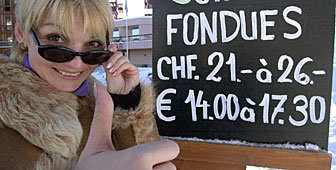
Euro enjoys smooth transition

The introduction of the single European currency has gone better than expected, even in Switzerland which is not part of the euro zone.
The euro is now the only legal tender in 12 countries of the European Union as the transition period that began on January 1 comes to an end. Eurosceptics, who predicted financial and economic chaos, have so far been wide of the mark.
The smooth changeover has surprised no one in Switzerland, which retains its own currency, the franc. “In most major towns, there isn’t any problem using the euro for cash transactions,” Werner Abegg, spokesman for the Swiss National Bank, told swissinfo.
According to Abegg, the euro is expected to prove popular in holiday and border areas, but the national bank does not see the euro becoming a parallel currency in Switzerland.
Euro comes to Switzerland
Banking experts forecast that around three per cent of transactions in Switzerland – which is not a member of the European Union – will be carried out in euros.
“We reckon that the euro will play a bigger role in payments than the individual European currencies did in the past,” he said.
The new currency has not been adopted by every EU country: Britain, Sweden and Denmark have all decided to give the euro a miss.
In Britain, despite often hysterical headlines in the country’s anti-euro press, opposition to the single currency appears to be waning.
More than a decade has passed since “The Sun” newspaper memorably told the then European Commission president where he could shove European integration, with its “Up Yours Delors” headline.
Early referendum
However, elsewhere a more measured debate has seen pressure growing on the government to call an early referendum on Britain joining the single currency.
Recent polls have shown a marked shift in attitude towards the euro over the past 12 months. An ICM opinion poll for “The Guardian” newspaper in December found that 62 per cent expected Britain to be part of the euro zone within a decade – twice as many as a year ago.
According to the same poll, the gap between supporters and opponents of the euro has also narrowed, with those in favour of immediately joining the euro now numbering 31 per cent.
But despite a rash of speculation, the Chancellor Gordon Brown is reported to be sticking to his guns and insisting no decision will be taken until the five economic tests for British euro membership have been fulfilled.
Single currency
One of the chancellor’s closest aides, the chief economic adviser to the Treasury, Ed Balls, insisted on Monday that the decision to join the single currency must be based on economic rather than political grounds.
The five economic tests, which were set out by Prime Minister Tony Blair and Brown after Labour’s 1997 general election victory, cover whether euro-entry would promote growth, jobs, stability and investment. The Treasury says an assessment of the tests will be completed by June 2003.
In Germany, the passing of the deutschmark left tears in the eyes of some of the population. In one poll, more than half the women surveyed said they would miss the mark, while only 40 per cent of men were of the same opinion.
One in three Germans polled said they were against the euro. But what really angered people was not so much the new currency, but rather the price increases that followed the introduction of the euro.
The increases have rattled consumer confidence and cast doubt on whether the euro will have a positive impact on the job market.
Euro transition
The Austrians have experienced a smoother euro transition. According to a survey, middle-aged men and people with better education and salaries had few problems with the switch; while youngsters and the elderly had more to complain about.
In France, where euro-scepticism was rife and a favourite theme for some politicians in this election year, many natives have been seen carrying around a euro-calculator while shopping.
This, though, is perhaps not such unusual behaviour. The last time the French modified their own currency, back in 1960, they spent years talking about “old” and “new” francs afterwards.
The French are also concerned about possible price increases, although their worries may prove to be unfounded. According to the national statistics office, the euro effect pushed up prices by just 0.1 per cent in January, while a further inflation increase of 0.4 per cent was blamed mostly on the cold weather.
swissinfo

In compliance with the JTI standards
More: SWI swissinfo.ch certified by the Journalism Trust Initiative






























You can find an overview of ongoing debates with our journalists here . Please join us!
If you want to start a conversation about a topic raised in this article or want to report factual errors, email us at english@swissinfo.ch.